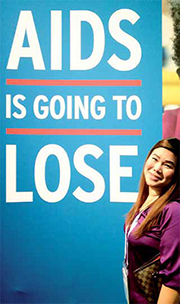Respecting the rights of trans* people within the HIV response
Respecting the rights of trans* people within the HIV response
HIV Australia | Vol. 11 No. 4 | November 2013
By Jetsada Taesombat and Rena Janamnuaysook
‘Everyone has the right to the highest attainable standard of physical and mental health, without discrimination on the basis of sexual orientation or gender identity. Sexual and reproductive health is a fundamental aspect of this right.’ Principle 17: The Right to the Highest Attainable Standard of Health1
Across Asia and the Pacific, a wide diversity of trans* identities and communities exist, many with long-standing culturally defined roles and traditions. However, the place of trans* people in society is marginalised due to high stigma and discrimination, and sadly violence is a common occurrence.
trans*
According to Global Action for Trans* Equality (GATE), trans* people includes those people who have a gender identity which is different to the gender assigned at birth and/or those people who feel they have to, prefer to or choose to – whether by clothing, accessories, cosmetics or body modification – present themselves differently to the expectations of the gender role assigned to them at birth.
This includes, among many others, transsexual and trans* people, transvestites, travesti, cross dressers, no gender and genderqueer people.
The term trans* should be seen as a placeholder for many identities, most of which are specific to local cultures and times in history, describing people who broaden and expand a binary understanding of gender.
A research finding from the SOGI Foundation shows that as many as 38.4% of trans* people in Thailand, a country commonly perceived as accepting of trans* people, have experienced socially and culturally structured discrimination and violence.2
A disturbing number of trans* people have been killed in hate crimes. Between 2008 and May 2013,3 111 trans* individuals were reportedly murdered across Asia and the Pacific, exclusive of cases that went unreported or were reported but not identified as trans*.
Human rights frameworks need to adequately address the legal vulnerability of trans* people, promote the legal recognition of trans identity and seek removal of any criminalisation.
Evidence also shows that trans* communities are vulnerable to HIV, with rates of prevalence often much higher than the general population.4
However, if public health services seek to address HIV alone, without addressing access to human rights protection and gender recognition, the provision of health services and the reduction of trans* vulnerability to HIV will remain major challenges.

in Washington DC, USA.
For better HIV response among trans* people, their particular health and human rights needs must be addressed with trans*-specific campaigns that demonstrate positive images of trans* people and do not reinforce negative stereotypes.
Within the HIV response, conflating trans* people with men who have sex with men within the HIV response will only alienate them. A paradigm shift is needed in current epidemiological approaches to ensure the human rights of trans* people are addressed alongside their HIV vulnerability.
This is key if we are to achieve zero stigma under the UNAIDS ‘three zeros strategy’ (zero new HIV infections, zero AIDS-related deaths and zero discrimination) for trans* people.
As trans* human rights activists – to achieve an enabling environment and reduction in stigma and discrimination – we recommend the following:
- Enabling environment and reduction in stigma and discrimination should be promoted among the families, communities, schools and workplaces in which trans* people live and work.
- Trans* health and HIV vulnerability to be addressed within a human rights framework that recognises trans* people as competent, respectful and capable of managing their health and wellbeing.
- Trans* health and HIV vulnerability to be addressed distinctly and separately from men who have sex with men interventions, and a specific and comprehensive package of services should be made accessible, including access to hormone support and sex reassignment surgery.
- Trans* communities to be empowered and capacitated to be meaningfully involved in the HIV response and other human rights dialogues through support to access education and mobilise their community.
- Trans* people to be treated with equal dignity and recognition by health service providers, international donors, governments, and non-government organisations, and never as numbers reached, or research subjects.
- Intensive awareness campaign on transgenderism and SOGI to be conducted among families, schools, workplaces, communities and health care providers.
- Key stakeholders must strive for positive changes in legal and political structures, particularly in laws and legislations related to HIV and AIDS. In addition, deterring and oppressive laws and practices incriminating sex work must be lifted.
Full endorsement and availability of laws and procedures recognising gender identity and gender expression, are necessary without delay. - Lastly, discrimination on the basis of gender identity and gender expression must be made punishable under the law and hate crimes must be prosecuted as such.
Activism for gender equality and social justice, collaborative partnerships and integrated approaches are required to achieve a just and welcoming society that respects and protects the human rights of trans* people.
References
1 The Yogyakarta Principles: The Application of International Human Rights Law in relation to Sexual Orientation and Gender Identity (2007).
2 Ronnapoom, S., Jetsada, T. (2013). Gender diversity and family project.
3 Constant rise in murder rates (2013, June 21). Retrieved from: http://www. transrespect-transphobia.org/en_US/tvt-project/tmm-results.htm/idahot-2013.
4 The Commission on AIDS in Asia. (2008). Redefining AIDS in Asia: crafting an effective response. Oxford University Press, New Delhi.
Jetsada Taesombat is the Coordinator of the Thai Transgender Alliance.
Rena Janamnuaysook is a Policy Officer at HIV/AIDS Global Action for Trans* Equality (GATE)

